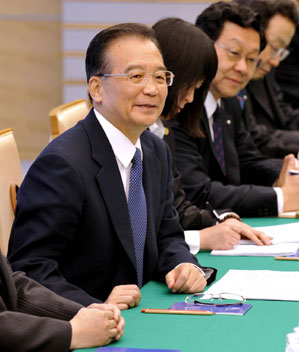Latest News
China, Japan to start formal talks on sea gas
By Zhang Jin and Qin Jize (China Daily)
Updated: 2010-06-01 06:51
 |
Large Medium Small |
|
|
Premier Wen Jiabao, who is on a three-day visit to Japan, and his Japanese counterpart Yukio Hatoyama also agreed to establish an emergency hotline between the prime ministers of the two nations to deal with any tensions.
In that landmark deal, the two sides reached a basic understanding on joint development and affirmed that Chinese enterprises welcome the participation of Japanese companies in the development of the existing oil and gas field in Chunxiao.
At Monday's summit, wartime historical disputes did not come up.
The two leaders also agreed to set up a crisis management mechanism for maritime incidents.
"We need to strengthen the handling of maritime crises, and avoid confrontations," Wen said.
He pledged to work with Japan to make the East China Sea, where a demarcation between the two countries is yet to be agreed upon, "a sea of peace, cooperation and friendship".
Tokyo lodged a protest with Beijing in April after it claimed a Chinese helicopter flew near a Japanese destroyer in waters off Okinawa.
Beijing rejected the protest, saying its warships were in Chinese waters on routine training drills and violated no international law.
Hatoyama on Monday echoed Wen and said Tokyo is ready to enhance cooperation with China to maintain peace and stability in the East China Sea.
Zhou Yongsheng, a professor at China Foreign Affairs University, said Japan is eager to deal with the East China Sea issue and the new agreement signals an important step toward that end.
He noted that the hotline would greatly help the two countries deal with disputes, especially breaking events.
"It would be a very effective channel," he said, noting China has similar hotlines to the United States and Russia.
Later in the day, Wen told Japanese business executives that huge economic flows between the two nations, with bilateral trade worth $238.7 billion last year, would cement closer ties.
"China and Japan have very close economic and trade ties. One could say they are at the point where neither could do without the other," said Wen.
Liu Jiangyong, a Beijing-based analyst on international studies, said though disagree-ments over the East China Sea may hamper the Sino-Japanese strategic relationship, they will not change the Hatoyama administration's policy toward China.
"Hatoyama is sincere when he tries to push the relationship forward," Liu said.
The Japanese leader is scheduled to visit Shanghai later this month for the World Expo.
Wen, who arrived in Tokyo on Sunday, also reached agreements with Hatoyama on food safety and the holding of animation and TV drama festivals to promote cultural exchanges.
Wen will leave Tokyo for Ulan Bator on Tuesday to continue his four-nation Asian tour, which will also take him to Myanmar.





